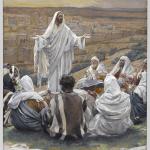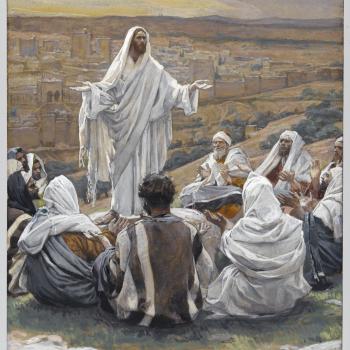In his commentary on the Sermon on the Mount, my medieval friend, Ludolph of Saxony, brings to our attention the Lord’s Prayer, beginning by commending it to us as the prayer that “excels all other prayers” and that which “enshrines an immense number of mysteries.” I’m not sure that opinion is widely shared in the evangelical world today. Protestantism’s dread of written prayers—rote, droned over, mechanical, and magical recitations of ancient formulae—has led to its widespread abandonment of the Lord’s Prayer in communal or private settings.
Ludolph, however, assumes that it is a foundational part of Christian spirituality, and that it was “designed” to be so by our Lord himself. It has the power to ignite true devotion if it is prayed consistently, earnestly, and confidently. He writes,
There are seven reasons that this prayer is so brief and consists of only a few words; first, so that it can be learned very quickly; second, so that it can be retained very readily; third, so that no one could claim he did not know it; fourth, so that it can be said very frequently; fifth, so that reciting it would not be tiresome; sixth, so that we may believe that what is asked will be given quickly; seventh, to encourage a devout heart rather than a multiplicity of words.
Ludolph spends some time arguing its centrality in Christian practice by citing both Chrysostom and Augustine to support his argument.
The Lord gave to his disciples a brief formula of prayer containing a full summary of everything we should ask for to attain blessedness and all other gits both here and hereafter. It is a short set of words, but it embraces all that is most spiritual and holy that we should seek, both because it comes from the mouth of the Most High and because it includes all the petitions found in every other prayer. O, how trustworthy and blessed this prayer is to us, for it was set down in order to for us by the Doctor of life and heavenly Teacher! And how blessed we will be if we are not content merely to recite the Lord’s Prayer, but put it into practice very faithfully! The Lord taught this prayer to his disciples to offer the hope of salvation to humanity. All that is necessary for our salvation is found in the few words of the Lord’s Prayer. (Chrysostom)
Whatever other words we may say, if we pray rightly and as becomes our desires, we say nothing but what is already contained in the Lord’s Prayer. If you study the words of all holy prayers you will find nothing that is not found in the Lord’s Prayer. Whoever prays anything not found in this gospel prayer is praying in a carnal way, and I do not know how such prayer can be legitimate, because the Lord instructed those who were reborn to pray only spiritually. (Augustine)
Of course praying the Lord’s Prayer can become an empty ritual. Anything at all can become an empty ritual. But what if indeed we are missing out on a great blessing by not praying the Lord’s Prayer regularly, together as a community and privately in our times of devotions?
William Willimon and Stanley Hauerwas, in Lord, Teach Us: The Lord’s Prayer and the Christian Life, write that “The Lord’s Prayer is a lifelong act of bending our lives toward God in the way that God has offered.” In praying it—regularly, even ritually; daily, even hourly; privately and corporately—we are inviting the “mysteries” of God’s name, God’s kingdom, God’s will to penetrate our hardened hearts, we are recognizing the desperate need we have of God’s provisions and protections, and we are confessing our need for forgiveness.
“All that is necessary for our salvation is found” in these few words. Why on earth would we not be praying it regularly?
Note: For a brief introduction to Ludolph of Saxony, a medieval “best-selling author,” read this.


















